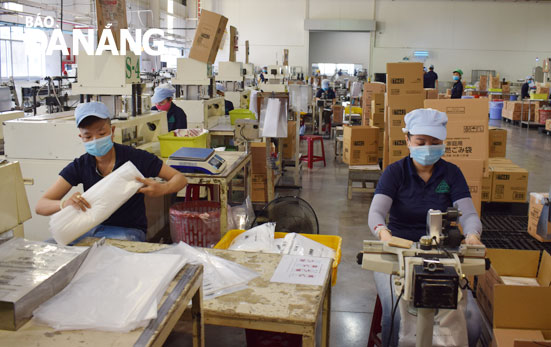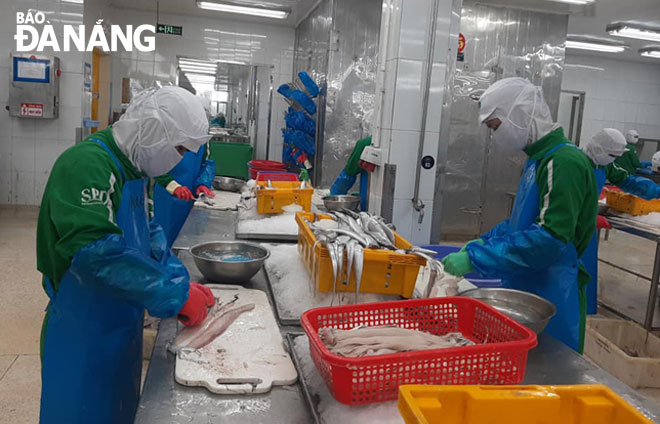Da Nang businesses significantly benefit from free trade agreements
Amidst the complex developments of COVID-19, that Da Nang-based businesses, like others nationwide, have benefited from free trade agreements such as the EU-Viet Nam Free Trade Agreement (EVFTA) and the Comprehensive and Progressive Agreement for Trans-Pacific Partnership (CPTPP) is considered a bright spot in the city's economic picture in recent months.
 |
| Enterprises has seen positive signs in their production and business activities in the first months of the year, especially when the entry into force of FTAs. Here is an image of production activities at the Apple Film Co., Ltd in Hoa Cam Industrial Park, Cam Le District. Photo: KHANH HOA |
Sharply growing number of orders
Under EVFTA, which officially took effect from August 1, 2020, Viet Nam cuts 65% of import tax on EU commodities after the deal takes effect, while the rest will be erased over a 10-year period. Meanwhile, the EU eliminates more than 70% of tariffs on Viet Nam’s commodities after the deal comes into fore, while the remainder will be phased out over the next 7 years.
Accordingly, products that benefit the most are seafood, textiles, footwear, wooden products, rice and more. This is considered a great opportunity for Da Nang businesses to take advantage of increasing amount of orders and export revenues to offset a sharp decrease in both revenue and profit in 2020 due to the COVID-19 crisis.
Mr. Huynh Trinh, Chairman of the Board of Directors, General Director of the Da Nang Forestry Product Export JSC said that the most practical benefit that FTAs bring to businesses is a significant increase in the number of orders.
“As soon as EVFTA came into effect, EU importers prioritised buying Vietnamese wooden products to enjoy tariff reductions. The EU is now one of the world’s largest importers of wood furniture. After a long time of preparation, we are very excited about beginning enjoying benefits from EVFTA”, said Mr. Trinh.
Among the products enjoying benefits from CPTPP and EVFTA, the seafood industry has still maintained the stable growth as its penetration into to Europe, Japan, Korea and other foreign markets has become smoother.
Fully aware of the highly beneficial EVFTA, such well-renowned seafood manufacturers, processors and exporters citywide as the Thuan Phuoc Seafood and Trading Corporation and the SEADANANG have rolled out their own long-term plans to make better penetration into the challenging EU market.
SEADANANG has seen a growing number of orders from European partners. “Since the beginning of this year, we have maintained good production activities with export sales estimated at US$2.5 million /month,” said SEADANANG General Director Tran Nhu Thien My.
Thuan Phuoc, over recent years, has always accounted for a significant proportion of total Da Nang seafood export revenue. The company's products have claimed their firm berths in many European countries with its main export item being frozen shrimp.
FTAs have also forced many textile and garment enterprises in Da Nang to boldly step up their investment in importing high-quality production machinery and access standard raw materials.
Specifically, the EVFTA requires rules of origin to apply from fabric onwards, meaning that exports to the EU must use fabric produced in Viet Nam or the EU. The agreement also allows firms to use fabric from countries which have FTAs with both Viet Nam and the EU.
As for the Hoa Tho Textile – Garment Joint Stock Corporation, the EU market now accounts for more than 12% of its total export turnover with the key export items being protective workwear, in addition to high quality jackets, suits, pants and yarn. In the first months of this year, the corporation recorded a double-digit growth.
 |
| Working ambiance is recoded at SEADANANG. Photo: KHANH HOA |
Increasing resilience, promoting economic growth
Nguyen Duc Tri, Chairman of the Board of Directors of the Hoa Tho Textile and Garment Corporation, Vice Chairman of the Viet Nam Textile and Apparel Association underlined a must-do for local industries to actively form closed -loop production systems to enjoy tariff preferences and form new supply chains to reduce their dependence on China and some other foreign markets as previously.
For the time being, EU is currently Viet Nam’s second largest textile and garment importer after the US.
Meanwhile, in order to meet many strict rules set by countries participating in FTAs, seafood businesses must constantly improve their production and business processes in a timely, more professional and proactive manner, especially in making preparations in terms of raw materials.
In the current context that many countries are still coping up with COVID-19 spread, benefiting from FTAs is considered an important boost, helping businesses to proactively stabilise their production and business activities, increase their resilience against risks, especially as the global supply chain has yet to fully recover after nearly two consecutive years of being affected by the pandemic.
Also, benefiting from FTAs is also dubbed as a lever to promote the city's economic development in the coming months, towards realising the city’s a growth target of 6% in the gross regional domestic product (GRDP) this year.
Reporting by KHANH HOA- Translating by A.T